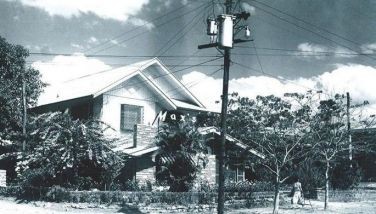Fixing weaknesses in the laws

The Isabela bridge collapsed on Feb. 27. No report yet. Red flags issued years before were ignored. And yet, there was not even any earthquake event when the Cabagan-Santa Maria bridge in Isabela collapsed. An alleged overloaded truck was pinpointed as the culprit for causing the collapse of the newly retrofitted suspension bridge.
President Ferdinand “Bongbong” Marcos Jr. (PBBM) echoed the initial report to him on the cause of collapse as largely due to “under design” of the suspension bridge. PBBM validated the report after he and Department of Public Works and Highways (DPWH) Secretary Manuel Bonoan went to the site of the collapsed portions of the bridge. To date, the DPWH has yet to submit its full investigation on the bridge collapse.
We could only envy how quickly government authorities of Thailand came out with its incident report on the collapse of a building during the magnitude-7.7 earthquake on March 28 that rocked Bangkok and Myanmar. Thai government building engineers released its official report on April 1 that pointed to twisted and bended steel bars as evidence of the “substandard” quality of steel products from Xin Ke Yuan Steel Corp. of China used in the collapsed building, which was still under construction when the earthquake struck.
Unfortunately, “the root cause” of such substandard quality of steel bars is also existing everywhere here in the Philippines.
We learned about this at the Kapihan sa Manila Bay news forum last Wednesday from our resource persons, led by the Office of Civil Defense (OCD) Undersecretary Ariel F. Nepomuceno; John Steven Magboo, senior trade-industry development specialist of the Bureau of Philippine Standards (BPS), an attached agency of the Department of Trade and Industry (DTI); Ronald Magsajo, president of the Philippine Iron and Steel Institute (PISI) and Roberto Cola, member of the Governing Council of the Metals Industry Research and Development Center of the Department of Science and Technology (DOST).
A focus on steel comes as the OCD reiterated that the Philippines’ first line of defense when an earthquake occurs is to maintain the quality and integrity of construction materials. With the Philippines sitting on the Pacific Ring of Fire and more than 170 fault lines and six active trenches, Nepomuceno said this is a “wake-up call” to Filipinos.
As OCD chief, Nepomuceno is also the concurrent executive director of the National Disaster Risk Reduction and Management Council (NDRMMC). Nepomuceno noted this scenario becomes even more alarming when one considers the structurally weak buildings across the country. And saddest part of this situation, he noted, is that most of them can be found on “do-it- yourself” (DIY) houses of poor informal settlers, many of them even put up in “no build” areas or hazard zones.
Magsajo, for his part, believes though A-1 contractors and big real estate developers and architects would not compromise their projects with the use of substandard materials for their high-rise structures. However, Magsajo warned, there are those who build their homes using DIY ways and rely on fly-by-night contractors or foremen offering their services to construct buildings at a lower cost but do not meet the required quality specifications.
Magsajo disclosed the PISI has been doing “random test-buys” over the past two years in various parts of the country. In a letter addressed to the DTI Fair Trade Group dated April 7, PISI alerted them about the results of “failed bars” from third party testing laboratories. Of the 28 tested in various dates and places, one of the steel companies was Philippine Sanjia Steel Corp. owned by Tony Yang.
Also known as Yang Jian Xin and Antonio Lim, he is currently detained following his arrest in September last year due to pending criminal cases in courts. Magsajo disclosed the PISI random test-buys in a hardware store in Zarraga, Iloilo found IF-made steel produced by Yang’s factory that remains operational in Cagayan de Oro City.
Cola made an impassioned appeal to the Marcos administration to ban the induction furnace (IF) process in steel factories which produces substandard steel bar products that compromise public safety. “The main drawback of IF facilities is that there is no process of removing the harmful elements in the liquid steel, thus resulting in inconsistent quality of products produced,” Cola pointed out.
In 2017, Cola recalled, Beijing prohibited the use of the IF process after causing widespread air pollution in China. The IF process was later also banned in Taiwan, Japan, Indonesia and Thailand. These neighboring countries have “proven” that the method only produces low-quality steel construction materials, he stressed.
“This is dangerous for the citizens. The government should do the same and ban this process,” Cola exhorted. “The least prepared during an earthquake are those who buy in hardware stores to make their own homes,” Cola warned.
“The root problem of this is the plants whose processes are ill-equipped to produce metals required for earthquake-prone areas,” he asserted.
According to him, IF facilities are currently operating in several areas in the country, including Pampanga, Bataan, Bukidnon and Valenzuela. Notably, the annual IF steel-making capacity in the Philippines has increased from less than 150,000 metric tons in 2017 to around three million metric tons today. Precisely because these IF companies from China relocated their factories to the Philippines, Cola deplored.
This IF process of making steel is an old method that fails quality global and Philippine safety standards. The new and cutting-edge system now uses electric arc furnace. This technology is cleaner and greener, and produces top-quality rebars.
Addressing the concerns raised by the private sector, Magboo disclosed the DTI is strictly enforcing the Philippine Standards to ensure quality control on all construction materials, from cement to steel bars. Magboo reported DTI confiscated P4.19 million worth of substandard steel bars last year. He vouches for the DTI’s verification audits and inspections of manufacturing plants upon receiving reports.
Despite IF steel products still being sold here, Magboo admitted the DTI’s existing standards do not specify a particular process to be used in steel bar production. This one definitely is a weakness in our existing laws which needs urgent fixing by our policymakers.
- Latest
- Trending





















